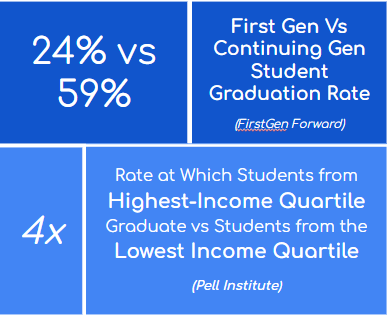Comprehensive Support for First-Generation and Low-Income Students
by Natalie Scheidel, 2024 Scheidel Foundation College Success Fellow
The promise of a college degree carries with it the hope of increased earning potential, expanded career opportunities, and improved quality of life. However, recent studies suggest that merely providing a means for a student to attend college is not enough to ensure successful outcomes. True opportunity and success can only be achieved when students are provided with comprehensive resources and support systems that address the multifaceted challenges they face.
Research highlights that low-income and first-generation students—those whose parents have not completed a bachelor’s degree—face a myriad of challenges throughout their educational journeys. These barriers are deeply intertwined with social stratification, perpetuating generational inequality. The result is an entrenched academic achievement gap in the US.
The journey of first-generation and low-income students is often fraught with obstacles that extend far beyond the financial realm. These challenges are deeply rooted in social structures and perpetuated through generations, making it hard for students to break the cycle of inequality without significant support.

Holistic Support for College Success
The Scheidel Foundation provides grants to organizations that emphasize comprehensive approaches to supporting first-generation and low-income college students. These models go beyond traditional scholarship programs by addressing multiple facets of student success, recognizing that financial assistance alone is insufficient to ensure long-term socioeconomic mobility.
The Foundation’s College Success grants focus on ensuring that individuals receive the assistance needed to attain a post-secondary credential. These grants help launch, enhance, or scale efforts that aid students in completing a certificate, or a two or four-year degree from an accredited college or university, and successfully begin a career journey.
These initiatives often include elements such as:
- Mentorship and Coaching
- Long-term Support
- Community Engagement & Referrals
- Non-Scholarship Financial Support (microgrants, emergency funds, etc)
The following 2024 College Success grantees demonstrate a range of holistic, effective approaches:
- Booker Promise
- CollegeTracks
- College Track
- Collegiate Directions
- College and Career Dreams
- First Generation College Bound
- Future Link
- Generation Hope
- KIPP Jacksonville
- New Futures
- Take Stock in Children
- Thrive Scholars
- UnidosNow
In addition, the Scheidel Scholar program at Florida State College in Jacksonville (FSCJ) utilizes a dedicated staff person to advise scholars on available academic and community services, guide them through the college system, provide them with a sense of community, and help them develop skills for persistence.
While the problem of the achievement gap goes far beyond any one program’s ability to solve, the importance of these comprehensive, holistic strategies becomes increasingly clear: in order to create greater ability for first-generation, low-income students to attain a college credential, we must provide a greater breadth of support.
Cited: FirstGen Forward, Consider This Data; The Pell Institute, 2024, Indicators of Higher Education Equity in the United States 2024: 50-Year Historical Trend Report

